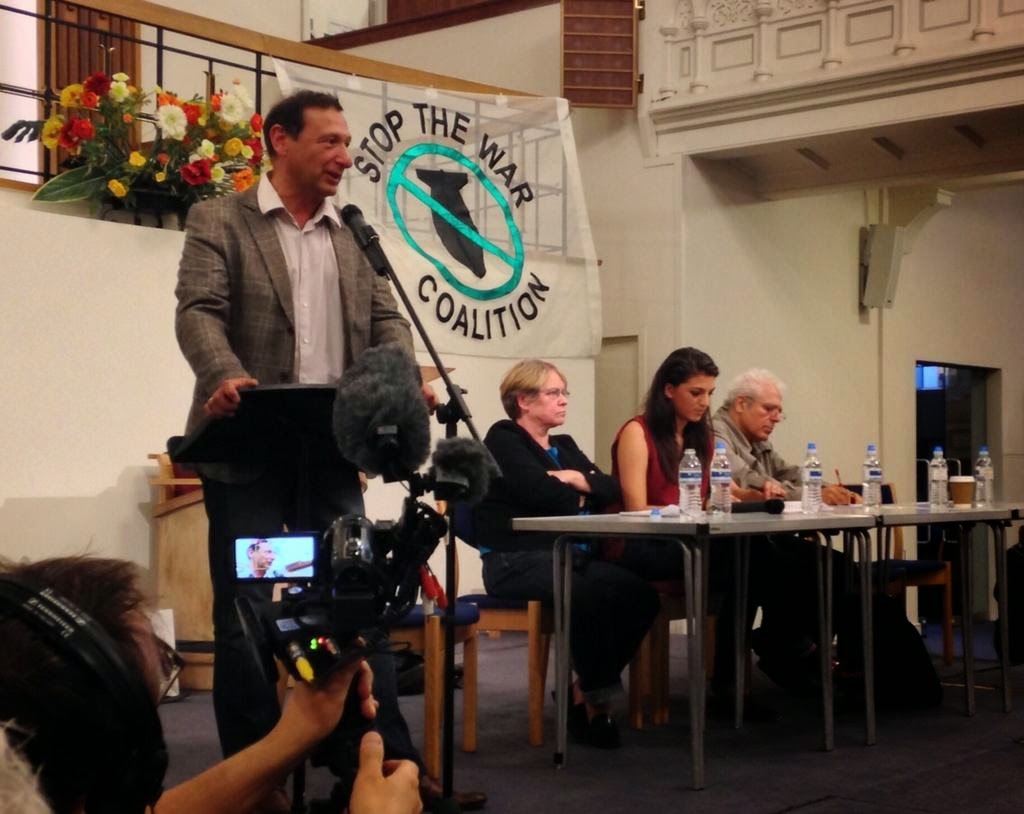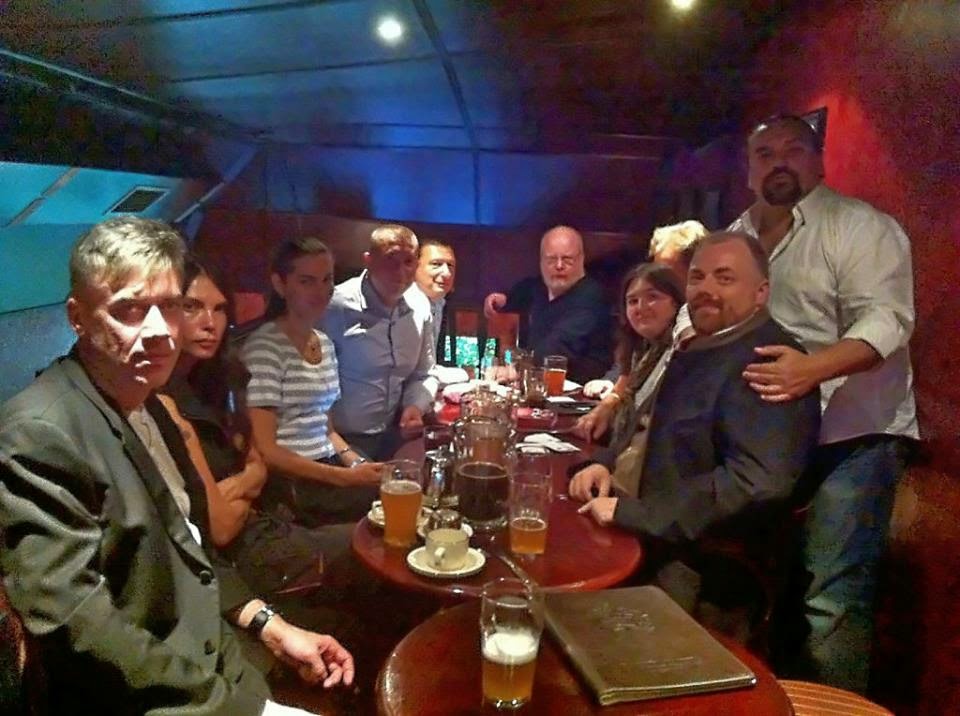Deluded British leftists like to invite Russian allegedly left-wing publicist Boris Kagarlitsky of the Institute for Globalization Studies and Social Movements to take part in their events.
On 2 June this year, he joined, via Skype, the founding meeting of the "Solidarity with the Antifascist Resistance in Ukraine" that was attended by Richard Brenner, Lindsey German (Counterfire), Andrew Murray (Communist Party of Great Britain), Alan Woods (International Marxist Tendency) and Sergei Kirichuk (Borotba).
On 27 August, he spoke at the public meeting "How to stop the spread of War". Other speakers and participants included Tariq Ali, Lindsey German, Jeremy Corbyn MP, Owen Jones, Francesca Martinez, Stafford Scott, Kate Smurthwaite, and Christian Fuchs.
In Russia, however, Kagarlitsky prefers a different company. I have already mentioned that Kagarlitsky took part in a meeting of the Russian far right "Florian Geyer" club headed by Russian right-wing Islamist Geydar Dzhemal and frequented by Russian fascists such as Aleksandr Dugin, Maksim Kalashnikov and Mikhail Leontyev, Swedish anti-Semite Israel Shamir and Italian Nazi-Maoist Claudio Mutti among others.
Kagarlitsky (and Richard Brenner) also took part in the conference "The world crisis and the conflict in Ukraine" held in annexed Yalta on 6-7 July 2014 and co-organised by his Institute for Globalization Studies and Social Movements. Other co-organisers of this conference - the ultranationalist "Novaya Rus" (New Russia) headed by Aleksey Anpilogov - held a second conference titled "Russia, Ukraine, New Russia: global problems and challenges", to which they invited international fascists such as Frank Creyelman (Vlaams Belang), Luc Michel (Parti Communautaire National-Européen), Márton Gyöngyösi (Jobbik), Roberto Fiore (Forza Nuova), Mateusz Piskorski (Samooborona) and Nick Griffin (British National Party). (Only Piskorski and Fiore, however, were able to come.)
And here is a photograph that features Kagarlitsky in a company of Russian fascists: Aleksey Belyaev-Gintovt (prominent member of Aleksandr Dugin's International Eurasian Movement), Yevgeniy Zhilin (militant extreme right Oplot group), Konstantin Krylov (far right "Russian Social Movement - Russia") and Yegor Kholmogorov.
Next time, British leftists may want to invite Kagarlitsky's fascist friends to some left-wing meeting in London too.
Russian investigative journalists have established that Kagarlitsky has been cooperating with the Kremlin at least since 2005. His task has been to help control the Russian left-wing movement outside the sphere of influence of the Communist Party of the Russian Federation (CPRF). In 2006, he published a report titled "Gale Warning" that aimed at exploring the levels of corruption within Russian political parties. According to Kagarlitsky, the CPRF was the most corrupt party in Russia. While I have no doubts that the CPRF is a corrupt organisation, the most interesting and revealing aspect of Kagarlitsky's report is that he completely ignored two major Russian parties: pro-PutinUnited Russia and Vladimir Zhirinovsky's far right, misleadingly named Liberal-Democratic Party of Russia. Kagarlitsky's report has nothing on them - a quite telling omission. (The CPRF's leader Gennadiy Zyuganov successfully sued Kagarlitsky for libel, and the latter made an apology.)
Internationally, Kagarlitsky holds himself as a critic and opponent of Putin's regime, but in fact he is a tool of this very regime, a tool that is used to tamp down the genuinely left-wing anti-Putin movement in Russia. It is, therefore, not surprising that Kagarlitsky's Institute for Globalization Studies and Social Movements became one of the organisations that have recently received grants from the Kremlin. Kagarlitsky is doing a good job throwing dust in the eyes of the international left, so Putin knows that he is worth financial support.
On 2 June this year, he joined, via Skype, the founding meeting of the "Solidarity with the Antifascist Resistance in Ukraine" that was attended by Richard Brenner, Lindsey German (Counterfire), Andrew Murray (Communist Party of Great Britain), Alan Woods (International Marxist Tendency) and Sergei Kirichuk (Borotba).
On 27 August, he spoke at the public meeting "How to stop the spread of War". Other speakers and participants included Tariq Ali, Lindsey German, Jeremy Corbyn MP, Owen Jones, Francesca Martinez, Stafford Scott, Kate Smurthwaite, and Christian Fuchs.
 |
| Boris Kagarlitsky speaking at the meeting "Solidarity with the Antifascist Resistance in Ukraine", 27 August 2014, London |
Kagarlitsky (and Richard Brenner) also took part in the conference "The world crisis and the conflict in Ukraine" held in annexed Yalta on 6-7 July 2014 and co-organised by his Institute for Globalization Studies and Social Movements. Other co-organisers of this conference - the ultranationalist "Novaya Rus" (New Russia) headed by Aleksey Anpilogov - held a second conference titled "Russia, Ukraine, New Russia: global problems and challenges", to which they invited international fascists such as Frank Creyelman (Vlaams Belang), Luc Michel (Parti Communautaire National-Européen), Márton Gyöngyösi (Jobbik), Roberto Fiore (Forza Nuova), Mateusz Piskorski (Samooborona) and Nick Griffin (British National Party). (Only Piskorski and Fiore, however, were able to come.)
And here is a photograph that features Kagarlitsky in a company of Russian fascists: Aleksey Belyaev-Gintovt (prominent member of Aleksandr Dugin's International Eurasian Movement), Yevgeniy Zhilin (militant extreme right Oplot group), Konstantin Krylov (far right "Russian Social Movement - Russia") and Yegor Kholmogorov.
 |
| Boris Kagarlitsky in a company of Russian fascists, September 2014, Moscow (?) |
Russian investigative journalists have established that Kagarlitsky has been cooperating with the Kremlin at least since 2005. His task has been to help control the Russian left-wing movement outside the sphere of influence of the Communist Party of the Russian Federation (CPRF). In 2006, he published a report titled "Gale Warning" that aimed at exploring the levels of corruption within Russian political parties. According to Kagarlitsky, the CPRF was the most corrupt party in Russia. While I have no doubts that the CPRF is a corrupt organisation, the most interesting and revealing aspect of Kagarlitsky's report is that he completely ignored two major Russian parties: pro-PutinUnited Russia and Vladimir Zhirinovsky's far right, misleadingly named Liberal-Democratic Party of Russia. Kagarlitsky's report has nothing on them - a quite telling omission. (The CPRF's leader Gennadiy Zyuganov successfully sued Kagarlitsky for libel, and the latter made an apology.)
Internationally, Kagarlitsky holds himself as a critic and opponent of Putin's regime, but in fact he is a tool of this very regime, a tool that is used to tamp down the genuinely left-wing anti-Putin movement in Russia. It is, therefore, not surprising that Kagarlitsky's Institute for Globalization Studies and Social Movements became one of the organisations that have recently received grants from the Kremlin. Kagarlitsky is doing a good job throwing dust in the eyes of the international left, so Putin knows that he is worth financial support.